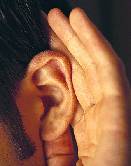

Older adults with impaired hearing may have a shorter life span than their peers without hearing problems, a new study suggests.
Researchers found that among nearly 1,700 U.S. adults aged 70 and up, those with hearing loss were 21 percent to 39 percent more likely to die over the next several years.
Experts stressed that the findings, published in the Sept. 24 online edition of JAMA Otolaryngology-Head & Neck Surgery, do not prove that hearing impairment, itself, shortens people’s lives.
“This is an interesting observation, but it also needs to be taken with a grain of salt,” said Dr. Ana Kim, director of otology research at the New York Eye and Ear Infirmary of Mount Sinai, in New York City, who was not involved in the research.
“There are so many variables that go into mortality,” she said. “It would be too simplistic to say this is because of hearing impairment.”
Lead researcher Kevin Contrera, of Johns Hopkins University in Baltimore, agreed that the findings do not prove hearing loss is to blame.
But, he said, the study results call attention to the fact that hearing impairment is not just a normal part of aging.
“People tend to think, ‘Oh, everybody loses their hearing as they get older,'” Contrera said. “But hearing loss has important effects on your life.”
About one-third of U.S. adults aged 65 to 74 have at least mild hearing loss, according to the U.S. National Institutes of Health. That’s true of almost half of people aged 75 and older.
For the new study, Contrera and his colleagues combed through data from an ongoing government health survey. The researchers focused on nearly 1,700 adults aged 70 and older who’d undergone hearing tests.
Overall, 589 study participants had mild hearing loss, while 550 had moderate to severe impairment. The rest — 527 in all — had normal hearing.
Older adults with hearing loss did tend to have other issues, as well — including higher rates of smoking, heart disease and stroke. But even when the researchers factored that in, people with impaired hearing had a higher risk of dying over the next six years.
Other research, Contrera said, has linked hearing loss with poorer physical health and a quicker decline in memory and thinking skills. So it’s plausible that hearing loss could have directly contributed to the higher death rates seen in this study.
Still, Kim pointed out, the study could not account for all of the factors that affect people’s longevity. And even though hearing loss has been tied to other health issues, it’s not clear that hearing troubles are the cause, she said.
Ideally, Kim said, studies would look at the effects of treating hearing loss: Do patients given hearing aids, for example, live longer and healthier lives?
Contrera agreed. “The big question is, do hearing aids and other therapies have an impact?” he said.
Regardless of whether hearing loss ultimately affects longevity, it does affect quality of life, both Kim and Contrera said.
Older adults with hearing problems may avoid going out and socializing, essentially getting “divorced from life,” Contrera said.
“If you do feel you have hearing impairment, certainly get it checked out,” Kim said. “It’s a quality-of-life issue.”
Right now, Contrera said, it’s estimated that only about one-fifth of people with “clinically significant” hearing loss use hearing aids.
One issue is lack of awareness, he said. “Often people just don’t recognize the effects that hearing loss can have on their lives.”
But there are practical barriers, as well. Hearing aids are imperfect, Contrera said, and it can be difficult for people to hear when there is a lot of background noise, for example.
“We definitely need to improve the effectiveness of hearing aids,” Contrera said.
And then there’s the cost. Hearing aids are pricey — around $4,000 or more, Contrera said — and they are not covered by insurance or Medicare.
“A hearing aid could end up being the third-biggest purchase of your life,” Contrera said, “after your house and your car.”
More information
The U.S. National Institute on Deafness and Other Communication Disorders has more on hearing loss in older adults.
Source: HealthDay
Copyright © 2024 HealthDay. All rights reserved.

Leave a Reply